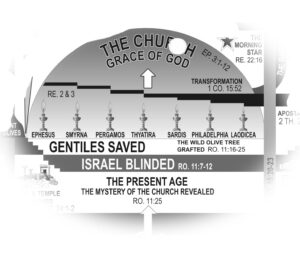 ‘After These Things’ Chapter 4.2 – What the Father has done in Grace for the Church’s Glory
‘After These Things’ Chapter 4.2 – What the Father has done in Grace for the Church’s Glory
From our book ‘After These Things – Summaries of John Nelson Darby’s Papers on Prophecy – and more…’ Compiled by Daniel Roberts. For more about this book click on the picture or CLICK HERE
The Name of the Father
A summary of the Second Lecture by J N Darby on the Present Hope of the Church – Geneva 1840 entitled ‘The Church and its Glory’
The Resurrection of the Church
Reconciliation of all Things to Christ
Our Inheritance
 Christ is exalted, sitting on the ‘right hand of the majesty on high’, waiting for the resurrection of the Church. The Church has already been reconciled to Christ, the evidence of this being in the presence of the Holy Spirit in us believers. Reconciliation of all things to Him is future.
Christ is exalted, sitting on the ‘right hand of the majesty on high’, waiting for the resurrection of the Church. The Church has already been reconciled to Christ, the evidence of this being in the presence of the Holy Spirit in us believers. Reconciliation of all things to Him is future.
In the dispensation that will start at the Saviour’s coming, the heirs will have the enjoyment of their inheritance. All things will be subjected to Christ, and to His Church, united to Him and manifested with Him.
‘Blessed be the God and Father of our Lord Jesus Christ, who has blessed us with every spiritual blessing in the heavenlies in Christ…and has put all things under his feet, and gave him to be head over all things to the assembly, which is his body, the fulness of him who fills all in all.’ Ephesians 1 (see the whole chapter)
The Name of Father
Our hope goes far beyond escaping the wrath to come). It involves our participating in the glory of the Son, as it is said in John 17:22, ‘And the glory which thou gavest me I have given them’. In this scripture, there is a message to the world that the Father loves us as He loves Jesus. By the Holy Spirit, we are full of joy and intelligence as to those riches in glory.
Considering the Church and its glory leads us to the name of Father – how God has revealed Himself to us. The Father has given the Church to Christ as His bride, with a view to its full participation in all His glory. In adopting us as His children, the Father has bestowed on us nothing less than the dignity and glory of the Son, ‘firstborn among many brethren’ (Romans 8:29). As the bride of Jesus, we enjoy all the privileges that belong to Him, because of His incomparable love to us.
Ephesians 1
God presents Himself as ‘our Father’ (v. 2), and ‘the Father of our Lord Jesus Christ’ (v. 3). In v.4-8, we have salvation, ‘accepted in the beloved’. We are predestined to be the Father’s children having redemption through Christ’s blood. How great are the riches of God’s grace!
In v. 8-10, we see the actual power of grace, introducing us into the knowledge of the purpose (or decree) of God. God treats us as His friends and calms our souls to see the end of all man’s agitated efforts. God will ‘gather together in one all things in Christ, both which are in heaven and which are on earth.’ (v.10).
Furthermore, we have the sealing by the Spirit and our future participation in the glory: ‘Sealed with the Holy Spirit of promise, which is the earnest of our inheritance until the redemption of the purchased possession, unto the praise of his glory’ (v. 13).
The remainder of the chapter is a prayer for the faithful to understand their hope in an exalted Christ, to whom the church is united, and that they might appreciate the power that works towards them as believers.
The Resurrection of the Church
Christ is sitting on the ‘right hand of the majesty on high’ (Hebrews. 1:3), waiting for the resurrection of the Church. He does not even know (as Man) when this should take place since as a Servant He waits entirely upon His Father.
Currently, Christ is glorified. But as yet, all things are not yet subjected to Him. We acknowledge His rights as Creator, as Heir of all things, as Head of the body, the Church. He is both Firstborn of every creature and Firstborn from the dead.
Christ will take the inheritance of all things as a Man, so that the Church, bought with His blood, and purified, should inherit all things with Him.
There are two fundamental points:
- Christ possesses all things.
- The Church, the bride of Christ, participates in all that He has, and in all that He is, except in His eternal divinity.
Jesus Exalted
We see in Ephesians 1:23:
- Jesus as the Head of the Church, His body.
- Jesus highly exalted at the right hand of the Majesty on high.
- All things under His feet.
- The Church introduced into the same glory.
We see in 1 Corinthians 15:
- The glorification of Jesus.
- All things subjected to Him.
- Head of a kingdom which He will possess as Man and which He will eventually deliver up to God the Father, with God all in all.
- The time for His being invested with royal power will have arrived, God having put His enemies as a footstool under His feet.
Reconciliation of all Things to Christ
We see in Romans 8:19-23 that the deliverance of creation will take place at the same time as the manifestation of the sons of God. Christ will be sitting at the right hand of God. He becomes Possessor of the heavens and the earth in fact, as He is that now by right. Were there, for example, a blade of grass that was not subjected to His power in blessing, Satan would have got an advantage over Christ, His rights, and His inheritance. Clearly, ‘all things’ relates to things in heaven and earth, not to sinners in unbelief.
The things of earth and heaven will be reconciled later, by the efficacy of His blood. ‘And, having made peace through the blood of his cross, by him to reconcile all things unto himself; by him, I say, whether they be things in earth or things in heaven. And you … now hath he reconciled in the body of his flesh, through death’ (Colossians 1:20),
The present creation is in misery and bondage. We sigh and groan because of that. All may be in disorder here, but we know Him who has redeemed us and made us heirs of all things. He has introduced us into the enjoyment of the love of the Father, enjoying the privileges as heirs.
When He comes, Christ will be the source of joy to all creation. All the righteous titles of Christ will be vindicated.
Heavenly Places
One of the spiritual blessings that we have now is to find our abode in the ‘heavenly places’. What we enjoy now in hope, though hindered in many ways, will be for us in actuality. The earth will feel the effect of that. ‘Wicked spirits in heavenly places[1]’ (see margin, Ephesians 6:12), will cease to be the continual cause of misery and chaos of a sinful world made by sin, the ruin and of the iniquity of the first Adam. Their place will be filled by Christ and His Church, reflecting His glory. She will beam upon the earth in blessing, and the nations will walk by her light. She will be the worthy and happy instrument of His blessings, the living demonstration of their success. God has done these things, ‘that in the ages to come, he might shew the exceeding riches of his grace in his kindness towards us through Christ Jesus’ (Ephesians 2:7). The earth will enjoy the fruits of the victory of the Christ, the last Adam. The joy of joys will be the communion of the Father and the Bridegroom for ‘God is love.’
Conclusion
Darby concludes ‘I have detailed to you, briefly and feebly, what is the destiny of the church. We live under the dispensation during which the heirs are gathered together. In the dispensation which will start at the coming of the Saviour, the heirs shall have the enjoyment of the inheritance of all things. All things shall be subjected to Christ, and to His church, united to Him and manifested with Him.
What is to follow that is not our business now. In that last period, God will be all in all, and Christ Himself, as Man, will be subject to God; and Chief, of a family, eternally blessed in the communion of God. God has loved that family, and His tabernacle will be in the midst of it – God, Father, Son, and Holy Spirit, eternally blessed. Amen.’
[1] The KJV translation is ‘spiritual wickedness in high places’, whereas the Darby version ‘spiritual power of wickedness in the heavenlies’. I cannot find a reliable translation which says ‘wicked spirits’ but Darby and others (Stoney, Raven etc) use the expression ‘wicked spirits’ in ministry. The Greek is ‘τὰ πνευματικὰ/ta pneumatika (spiritual things) τῆς πονηρίας/tes ponerias (of evil) ἐν τοῖς ἐπουρανίοις/en tois epouraniais (in heaven, or the celestial sphere) – See Strong. I cannot find the margin reference to which Darby refers.


3 thoughts on “What the Father has done in Grace for the Church’s Glory”